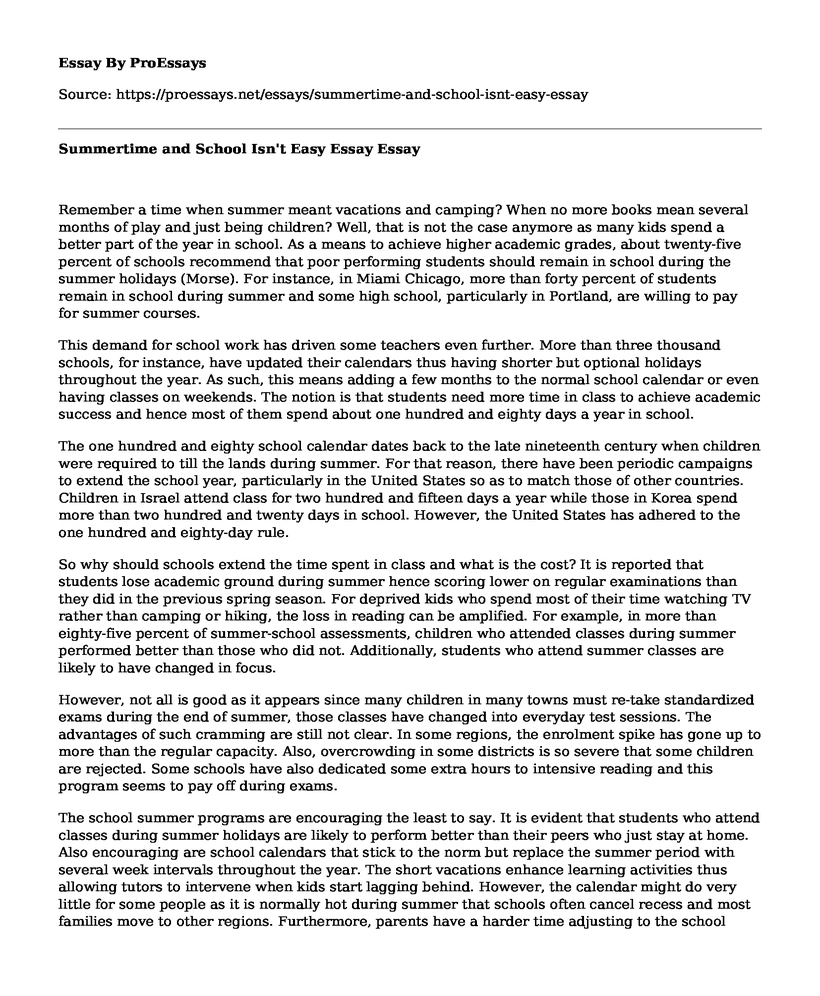Remember a time when summer meant vacations and camping? When no more books mean several months of play and just being children? Well, that is not the case anymore as many kids spend a better part of the year in school. As a means to achieve higher academic grades, about twenty-five percent of schools recommend that poor performing students should remain in school during the summer holidays (Morse). For instance, in Miami Chicago, more than forty percent of students remain in school during summer and some high school, particularly in Portland, are willing to pay for summer courses.
This demand for school work has driven some teachers even further. More than three thousand schools, for instance, have updated their calendars thus having shorter but optional holidays throughout the year. As such, this means adding a few months to the normal school calendar or even having classes on weekends. The notion is that students need more time in class to achieve academic success and hence most of them spend about one hundred and eighty days a year in school.
The one hundred and eighty school calendar dates back to the late nineteenth century when children were required to till the lands during summer. For that reason, there have been periodic campaigns to extend the school year, particularly in the United States so as to match those of other countries. Children in Israel attend class for two hundred and fifteen days a year while those in Korea spend more than two hundred and twenty days in school. However, the United States has adhered to the one hundred and eighty-day rule.
So why should schools extend the time spent in class and what is the cost? It is reported that students lose academic ground during summer hence scoring lower on regular examinations than they did in the previous spring season. For deprived kids who spend most of their time watching TV rather than camping or hiking, the loss in reading can be amplified. For example, in more than eighty-five percent of summer-school assessments, children who attended classes during summer performed better than those who did not. Additionally, students who attend summer classes are likely to have changed in focus.
However, not all is good as it appears since many children in many towns must re-take standardized exams during the end of summer, those classes have changed into everyday test sessions. The advantages of such cramming are still not clear. In some regions, the enrolment spike has gone up to more than the regular capacity. Also, overcrowding in some districts is so severe that some children are rejected. Some schools have also dedicated some extra hours to intensive reading and this program seems to pay off during exams.
The school summer programs are encouraging the least to say. It is evident that students who attend classes during summer holidays are likely to perform better than their peers who just stay at home. Also encouraging are school calendars that stick to the norm but replace the summer period with several week intervals throughout the year. The short vacations enhance learning activities thus allowing tutors to intervene when kids start lagging behind. However, the calendar might do very little for some people as it is normally hot during summer that schools often cancel recess and most families move to other regions. Furthermore, parents have a harder time adjusting to the school extension program, unlike their kids. For that reason, they have to adjust their work schedules to fit into the schools' program.
Works Cited
Morse, Jodie. Summertime and School Isn't Easy. Sunday, July 2000. http://content.time.com/time/magazine/article/0,9171,50599,00.html.
Cite this page
Summertime and School Isn't Easy Essay. (2022, May 26). Retrieved from https://proessays.net/essays/summertime-and-school-isnt-easy-essay
If you are the original author of this essay and no longer wish to have it published on the ProEssays website, please click below to request its removal:
- Evaluating Truth and Validity Exercises Paper Example
- Analyze Thy Self Essay Example
- Motivating Teachers for Improved Education Quality - Essay Sample
- Paper Example on Kids and Divorce: Dealing With Negative Behaviors
- Public Schools: Unraveling Their Impact on Child Welfare and Cultural Beliefs - Essay Sample
- Essay Example on Student-Athletes: Paying for Performance?
- Essay on Fostering Vision and Mission Integration in Fine View School: Strategies and Communication Approaches







